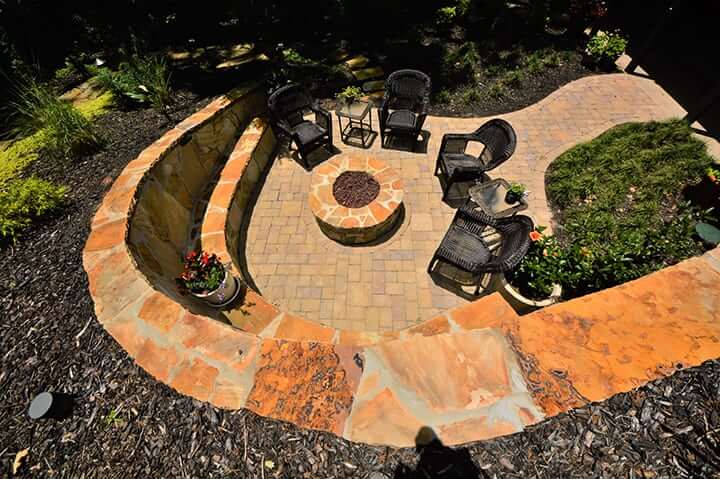Building fires is one of mankind’s oldest habits and traditions. In recent years, fire pits have become especially popular for homeowners looking for a way to make their outdoor area more useful. They offer not only a gathering place for entertaining, but also a bit of heat as the night cools off.
If you are looking to add a fire pit to your landscape design, then there are a few things to consider. Before you install a fire pit, be mindful of three things: location, size, and type.
In the Know about Fire Pits
Before searching for the perfect fire pit, take a few minutes to get the following information:
Are there any local restrictions or requirements on outdoor fire features?
Depending on your neighborhood or HOA, there could be some specifications about the types of fire pits that are acceptable. Other restrictions may relate to the size or permanency of the fire pit. Here are a few other potential regulations to keep in mind:
- Where the fire pit is placed due to the environment. Some neighborhoods and HOA’s may not allow fire pits near wooded areas due to potential fire hazards.
- If you must use smoke-fire pits. There may be regulations on where you can have a fire that produces smoke due to potential hazards or disruptions to neighbors.
- Is there a set number of feet from fencing or buildings? Many associations may require a certain distance from buildings or other flammable structures.
What’s your style?
Fire pits can be small or large, and virtually any shape. Ideally, you want a design that compliments your existing landscape and has features that work for your specific needs. Something to consider if you want a more majestic fire element is to have an outdoor fireplace built.
If you are looking for a higher-end, majestic fire element, consider building an outdoor fireplace.
Do you want seating around the fire pit?
Because fire pits are typically a gathering place, most homeowners want some type of seating space. Your seating areas should be far enough away from the pit to safely walk around it. For built-in seating, you should work with a professional construction team. The advantage of built-in seating is that there are fewer hazards, such as chairs tipping over.
What is the difference between wood-fired pits and gas fire pits?
While both will produce heat, wood-burning pits offer the traditional sounds of fire crackling and need you to keep firewood or kindling on hand. Wood-burning fires also produce a good amount of smoke, something to be mindful of. With gas fire pits, you get the benefits of warmth but without the smoke of a traditional fire. Gas fire pits do not provide the crackling and natural ambiance that wood fires offer.
In regard to gas fire pits, you will need to choose between propane or natural gas. Natural gas fire pits require installing gas lines. While propane saves on the cost of having to have a gas line installed, you also have to figure where to hide the propane tank. It can be challenging to balance easy access while keeping the tank hidden.
Portable or permanent?
A permanent fire pit is a great way to simplify a party set up. You just need to be sure it coordinates with the color, style, shape, and the materials you already have in your yard.
If you think that you will want to transport your fire pit to different locations, then you may want to opt for a fire bowl. Portable fire pit bowls are made of copper, steel, or cast iron and can be used with wood, propane, or natural gas.
When it comes to entertaining, outdoor fires are a great way to improve any outdoor living space. They offer a warm and inviting spot to relax year-round. For the best fire pits in the metro-Atlanta area, contact Outdoor Makeover & Living Spaces. We will work with you to create a custom fire feature solution in your landscape.


LET'S BE SOCIAL: